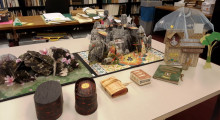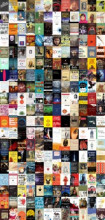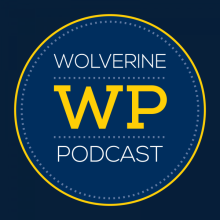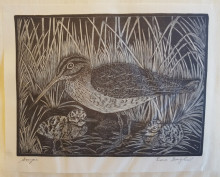Isaac Charles Levine
Library Blogs
Showing 1181 - 1190 of 1964 items

Hi! My name is Isaac Levine, and I’m the supervisor for the new and improved WorkBench space inside of the Digital Media Commons. I’d like to introduce you to the resources available through this space, and also talk about exciting new developments.

Brunelleschi's Dome tells the story of one of the greatest achievements in architecture, the dome of the cathedral of Santa Maria del Fiore, better known as the Duomo, in Florence, and of Filippo Brunelleschi, the irascible genius who created it. Author Ross King details Brunelleschi's many inventions, including his few failures, and his rivalry with another great artist, Lorenzo Ghiberti.
•
Have you always wanted to take a course about video games? Need to fill an elective slot for Winter term? Since most students are picking out which courses they'd like to take, we thought we'd share a list of interesting courses being taught next term. There are many other good ones out there as well, but here are a few to get you started.

For three years the Digital Public Library of America (DPLA) has been assembling a vast online library to document "the full range of human experience." By reaching out to libraries, archives, museums, and historical societies throughout the United States, the DPLA has gathered metadata from a vast number of digital collections online, including photographs, books, manuscripts, moving images, and audio recordings. Despite having a staff of fewer than twenty people, the DPLA now provides access to over fourteen million records.

Last Friday, I was privileged to welcome students from the College for Creative Studies in Detroit to the Special Collections Library. As part of a class on exploring the book, attendees were preparing for an assignment to create a one-of-a-kind artists’ book. The instructor had asked me to find examples of unusual artists’ books with interesting structures, offering me an opportunity to explore new dimensions of Special Collections’ artists’ book holdings.

Last month at the Party For Your Mind, students shared their favorite summer reads. We may be solidly in autumn now, but let's take a look back at what Wolverines read this summer!

The Wolverine Podcast is a series of short audio narratives comprising interviews and stories about students' experiences during their first year at the University of Michigan and beyond. This series is produced by University of Michigan students who use storytelling and audio engineering to craft compelling narratives from all around campus. Each interview is an exciting peer-to-peer process in which both parties can guide the conversation.
Episode one is a student interview about living on campus at the University of Michigan. Each Monday we will bring you a new student story. For more information about The Wolverine Podcast, contact mlibengaged@umich.edu.
Episode one is a student interview about living on campus at the University of Michigan. Each Monday we will bring you a new student story. For more information about The Wolverine Podcast, contact mlibengaged@umich.edu.

This past week, the University of Michigan Library was pleased to host the second annual Midwest Data Librarian Symposium (MDLS). The goal of the symposium was to offer librarians who work with research data in the midwest a chance to network and discuss issues in their fields.
•
The Shapiro Design Lab is now seeking submissions from University of Michigan students for its new Process Gallery, a project dedicated to showcasing the creative process in all the form it takes.

First published in 1789, Gilbert White’s The Natural History and Antiquities of Selborne describes the history and environment of the parish in eastern Hampshire where he lived for much of his life. The book offers gently reflective accounts of White's observations, structured as 110 letters to two friends - zoologist Thomas Pennant and amateur naturalist Daines Barrington. An immensely popular and influential work in the genre of nature writing, White's writings continue to inspire today.